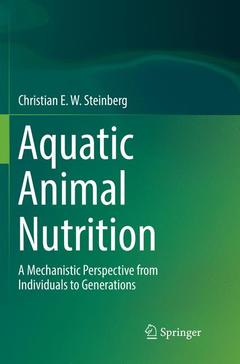Description
Aquatic Animal Nutrition, Softcover reprint of the original 1st ed. 2018
A Mechanistic Perspective from Individuals to Generations
Author: Steinberg Christian E. W.
Language: English
Subjects for Aquatic Animal Nutrition:
Approximative price 121.31 €
In Print (Delivery period: 15 days).
Add to cartPublication date: 12-2018
Support: Print on demand
Approximative price 168.79 €
In Print (Delivery period: 15 days).
Add to cartPublication date: 10-2018
Support: Print on demand
Description
/li>Contents
/li>Comment
/li>
This book is a unique cross fertilization of aquatic ecology and aquaculture. It shows how diets structure the digestive tract and its microbiota and, in turn, the microbiota influences life history traits of its host, including behavior. Short-term starvation can have beneficial effects on individuals themselves and succeeding generations which may acquire multiple stress resistances ? a mechanism strengthening the persistence of populations. From terrestrial, but not yet from aquatic animals, it is understood that circadian the rhythmicity makes toxins or good food. On the long-term, the dietary basis impacts succeeding generations and can trigger a sympatric speciation by (epi)-genetics.
This volume defines gaps in nutritional research and practice of farmed fishes and invertebrates by referring to knowledge from marine and freshwater biology. It also points out that dietary benefits and deficiencies have effects on several succeeding generations, indicating that well designed diets may have the potential to successfully improve broodstock and breeding effort.Chapter 1.Introduction: ‘You Are What You Eat’
Chapter 2.Diets and Digestive Tracts: ‘Your Food Determines Your Intestine’
Chapter 3.The Intestinal Microbiota:‘Your Eating Feeds a Plethora of Guests’
and ‘This Plethora of Guests Determines Who You Are and How Well You Do’
Chapter 4.Dietary Restriction, Starvation, Compensatory Growth: ‘Short-Term Fasting Does Not Kill You: It Can Make You Stronger’
Chapter 5.Chrononutrition: ‘The Clock Makes Good Food’
Chapter 6.Transgeneratinal Effects: ‘Your Offspring Will Become What You Eat’
Chapter 7. Trophic Diversification and Speciation: ‘Your Eating Fuels Evolution’
Unique cross fertilization of aquatic ecology and aquaculture
Defines gaps in nutritional research and practice of farmed fishes and invertebrates
Comparative and broad taxonomic coverage of aquatic animals
Comprehensive coverage of mechanisms at three levels




